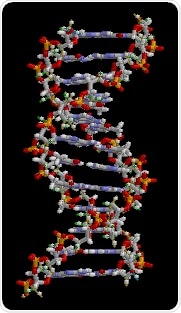A team of researchers, headed by scientists from the University of Manchester, has identified how the human genome regulates the development of several organs that are crucial to human life.

DNA animation. Image Credit: University of Manchester.
Published in the Nature Communications journal, the study provides useful insights into the poorly understood DNA stretches that sit between genes.
The study will help clinicians and scientists explain why certain infants and children are born with medical disorders like “hole in the heart.”
The study was financially supported by the Wellcome Trust and Medical Research Council in the United Kingdom. Collaborators in Cambridge and Seville in Spain were involved in this study.
About 30,000 or more genes are found in humans. While these genes hold the code to synthesize each protein in each one of the human cells, this accounts for just around 2% of the DNA, which is collectively composed of chemical units known as bases. Historically, the rest of the DNA was dismissed as “junk.”
Since that time, researchers have come to know that large genetic landscape of the supposed non-coding DNA—98% of human genome—essentially holds the mysteries for regulating how every gene is switched on or off in perfect order.
And that shows how a single genome can produce each of the different tissues in humans. Until now, investigators were not clear how this actually occurred at the crucial stage when human organs are initially assembled together.
Increasingly, where individuals are born with conditions that impact their brain, heart, limbs, and kidneys but have not acquired any apparent defect in one of their genes, their whole genome is read efficiently and rapidly by “Next Generation Sequencing” (NGS).
But searching for the 3 billion of so-called bases for the single issue is quite difficult—similar to looking for the proverbial needle in a haystack.
By modifying the same NGS technology, the researchers were able to home in on only the functional parts of the non-coding genome and identified it to be around 3% of the total.
The study has narrowed down the crucial areas quite significantly and precisely, and may support physicians in how they arrive at new diagnoses for patients.
The study will also help scientists interpret the basics of organogenesis, the major phase that occurs during five to eight weeks of pregnancy when the tissues of the body are initially assembled from rudimentary progenitor cells.
At this juncture, making sure that only the right kinds of genes are switched on in every different site is very crucial. Scientists are now aware of the accurate patterns of this genetic regulation for every organ.
The team double-checked the results while developing laboratory stem cells and zebrafish to demonstrate how the important non-coding parts of human DNA could illuminate green fluorescent protein suitably, even in the case of fish.
The project was headed by Professor Neil Hanley from The University of Manchester and a doctor at Manchester University NHS Foundation Trust.
Fingers crossed this new atlas on the deepest secrets of our genome will help scientists and doctors pinpoint previously unsolved genetic changes, helping to explain to patients and parents where things might have gone wrong. And in time, we hope it will begin the process for working out how we might be able to avoid this happening in the future.”
Neil Hanley, Study Lead and Professor, University of Manchester
Hanley continued, “What was striking was not just how particular sets of critical genes were turned on at the right time in the right place but how critical it was for the wrong genes to be shut off.”
In effect, you could tell as much about the heart by understanding why it wasn’t a kidney or a lung. We hope this new level of understanding will really help stem cell researchers benchmark the authenticity of the cells they are growing in the laboratory.”
Neil Hanley, Study Lead and Professor, University of Manchester
Source:
Journal reference:
Gerrard, D. T., et al. (2020) Dynamic changes in the epigenomic landscape regulate human organogenesis and link to developmental disorders. Nature Communications. doi.org/10.1038/s41467-020-17305-2.